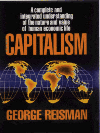
Many writers have commented on the theoretical achievements of George Reisman's powerful book, Capitalism: A Treatise on Economics (billed, and justly, as "a complete and integrated understanding of the nature and value of economic life"). Not so many have mentioned the wonderful preface, which tells the fascinating story of the author's intellectual development and how the book came to be written.
Capitalism began as an "explicit" project in 1977, close to twenty years before it was finally published. At that time Reisman outlined topics the book would cover. He did not begin actual writing until four years later. By 1990 he had produced a draft which Roy A. Childs Jr., editorial director of Laissez Faire Books, would wax enthusiastic about to all who would listen. (Alas, Roy did not live to see the finished book.) The manuscript was eight inches thick and had cigarette burns on the edges (contributed by Roy). Reorganizing and rewriting to achieve the final draft took another five years.
Reisman credits to two technological artifacts of Western civilization with helping him pull off such a difficult long-term project: the PC, and Louis L'Amour novels.
[A] very important element in the pleasure I have derived from the writing of this book rested on my use of a personal computer. When I wrote The Government Against the Economy and when I began writing this book, I experienced it as me, a fountain pen, and a yellow legal pad against the world. I fully believed, of course, that the pen is mightier than the sword and that with my pen I would ultimately prevail. But however mighty is the pen, the personal computer is far mightier ... To me, as a writer, the personal computer is the greatest of all the remarkable goods supplied by capitalism, surpassing even the personal automobile in its contribution to the ease and enjoyment of life.1
Appreciation of the life-serving benefits of economic process infuses the detailed theoretical exposition as well. Capitalism suffers from none of the detached, pseudo-objective, committee-produced droning of so many textbooks.
The contribution of Louis L'Amour was also pivotal. Reisman was inspired by a passage in a L'Amour novel "about the journey of pioneers traveling west in covered wagons, [which] described how on some days they would make so little progress that after a whole day's march, they could still see the remains of their campfires of the night before. The important thing to those pioneers, L'Amour stressed, was that each day they did make some progress—they always finished the day further west than they began it. This became an inspiration to me on all those days when the end result of many hours of work was that I had gotten only a few paragraphs beyond where I had finished the night before. ... I was still moving 'west,' so to speak."2
Dr. Reisman's account of how he came to study at the feet of both Ludwig von Mises and Ayn Rand is fascinating. He attended von Mises's famous NYU graduate seminar while still in high school and translated two of his books from the German. He met Ayn Rand through another student of Mises, Murray N. Rothbard.
Looking back over the past and all that has led to the writing of this book, I cannot help but take the greatest possible pride and satisfaction in the fact that along the way, in having been the student of both Ludwig von Mises and Ayn Rand, I was able to acquire what by my own standards at least is the highest possible "intellectual pedigree" that is possible for any thinker to have acquired in my lifetime, or, indeed, in any other lifetime.3
Copyright © 2000, The Daily Objectivist - Reprinted with permission of The Daily Objectivist and Davidmbrown.com.
12 May 2009 (last edit: 23 Jan 2024)
You can assist the work of Freedom Circle by purchasing one of the works discussed above:
